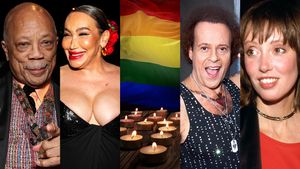A Pennsylvania
legislative panel in Harrisburg heard arguments Tuesday on
a measure intended to strengthen an existing ban on same-sex
marriages, even though it had already endorsed the
measure two weeks ago. The proposed amendment to the
state constitution would prohibit state, local, and
county governments from legally recognizing the unions of
unmarried same-sex or heterosexual couples. The
amendment would also define "marriage" as a union
between a man and a woman.
The house state government committee approved it
March 14 on a 15-13 vote, sending it to the
full house of representatives. The committee held a
public hearing on the measure Tuesday at the behest of one
of its members.
The house is expected to take up the bill April
4, a vote that would be the first step in a complex
amendment process, said Steve Miskin, a spokesman for
house majority leader Sam Smith. A similar bill is awaiting
action in the senate judiciary committee.
Nineteen states have adopted constitutional
definitions of marriage. Supporters of an amendment in
Pennsylvania consider it a safeguard against possible
lawsuits that might seek to overturn the state's 1996
Defense of Marriage Act, which bans legal recognition of
same-sex unions. Forty-one states have similar laws.
"It is inevitable that our laws will be
challenged in the future," said Maura Quinlan, an
attorney for the Pennsylvania Catholic Conference, the
lobbying group for the state's Catholic churches. "We
would be foolhardy to wait for an adverse decision."
In January a Baltimore judge struck down a
33-year-old Maryland law against same-sex marriage,
declaring it violates that state's constitutional
guarantee of equal rights. The judge immediately stayed
the order to allow the state to file an appeal with
Maryland's highest court.
"The courts have engaged in policymaking,
overruling the explicit statutes enacted by duly
elected state legislatures and ignoring the
overwhelming sentiment of the public," said Michael Geer,
president of the conservative Pennsylvania Family Institute.
Advocates for gays and lesbians,
domestic-violence victims, and children argued that
the amendment would prevent same-sex couples and unmarried
heterosexual couples from adopting or seeking
protection-from-abuse orders. They also said it would
discourage employers from offering domestic-partner benefits.
"You're telling some citizens of our
commonwealth that they are not equals, that they are
not going to be able to have the same rights, the same
responsibilities, or the same benefits as other people, and
that you don't care," said Stacy Sobel, executive
director of the Center for Lesbian and Gay Civil
Rights in Philadelphia.
Frank Cervone of Philadelphia's Support Center
for Child Advocates told the committee that adoptions
by same-sex couples are becoming increasingly common.
"It's not a social experiment. It's a social reality,"
he said.
Constitutional amendments must pass the general
assembly in each of two successive two-year sessions,
then win voter approval in a statewide referendum; the
earliest that could happen is 2007. The committee passed
the bill two weeks ago after a motion failed to delay a vote
until after a public hearing.
Rep. Paul Clymer, the committee's chairman, held
the hearing at the request of the committee's ranking
Democrat, Rep. Babette Josephs, who opposes the bill.
Josephs said she would like to have additional hearings
on the proposal. "The voters should not be kept in
ignorance," she said. (AP)


















































































